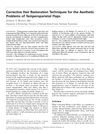 September 2019 in “Reactions Weekly”
September 2019 in “Reactions Weekly” Man experienced post-finasteride syndrome symptoms after using finasteride and dutasteride for hair loss.

Alopecia areata, a type of hair loss, may be passed through T cells and has genetic links, while treatments vary in effectiveness. Male pattern baldness can be treated with finasteride and is influenced by androgens in hair follicles.
 239 citations,
November 2000 in “Journal of The American Academy of Dermatology”
239 citations,
November 2000 in “Journal of The American Academy of Dermatology” Finasteride doesn't effectively treat hair loss in postmenopausal women.
 97 citations,
January 2014 in “Journal of The American Academy of Dermatology”
97 citations,
January 2014 in “Journal of The American Academy of Dermatology” Dutasteride 0.5 mg works better than finasteride and placebo for increasing hair in men with hair loss.
 89 citations,
December 2006 in “Lancet Oncology”
89 citations,
December 2006 in “Lancet Oncology” Taking 1 mg/day finasteride for hair loss significantly lowers PSA levels in men, which may affect prostate cancer screening.
 66 citations,
June 2013 in “Journal of Dermatological Treatment”
66 citations,
June 2013 in “Journal of Dermatological Treatment” Finasteride and dutasteride effectively treat hair loss, but may cause side effects like sexual dysfunction and depression.
 65 citations,
April 2020 in “International Journal of Molecular Sciences”
65 citations,
April 2020 in “International Journal of Molecular Sciences” PRP injections may be a safe, effective alternative for hair loss treatment compared to minoxidil and finasteride.
 30 citations,
March 2006 in “Dermatologic Surgery”
30 citations,
March 2006 in “Dermatologic Surgery” Finasteride improves surrounding scalp hair and increases hair density after hair transplant.
 24 citations,
November 2009 in “Pharmaceutical Development and Technology”
24 citations,
November 2009 in “Pharmaceutical Development and Technology” Transcutol P best increases Finasteride absorption for hair loss treatment.
 23 citations,
June 2017 in “Drug Design Development and Therapy”
23 citations,
June 2017 in “Drug Design Development and Therapy” Cyclodextrins improve finasteride's solubility and bioavailability for hair loss treatment.
 23 citations,
October 2005 in “Dermatologic Surgery”
23 citations,
October 2005 in “Dermatologic Surgery” Finasteride improves surrounding scalp hair and increases hair density after hair transplant.
 7 citations,
August 2019 in “Aesthetic Plastic Surgery”
7 citations,
August 2019 in “Aesthetic Plastic Surgery” Both surgical and non-surgical hair loss treatments lack a standard treatment plan and sufficient patient satisfaction data.
4 citations,
March 2022 in “Journal of The American Academy of Dermatology” Finasteride use in young men with hair loss is linked to sexual dysfunction.
1 citations,
December 2023 in “Biomolecules” Regulating cell death in hair follicles can help prevent hair loss and promote hair growth.
1 citations,
August 2022 in “Journal of Dermatological Treatment” Dutasteride is the most effective for hair loss but may cause sexual and mental side effects.
 January 2023 in “DIGITAL HEALTH”
January 2023 in “DIGITAL HEALTH” Most men using teledermatology for hair loss treatment saw improved hair and self-esteem, with some experiencing side effects.
January 2021 in “Springer eBooks” Combining PRP with other treatments can improve hair loss outcomes.
 February 2015 in “Global journal of dermatology & venereology”
February 2015 in “Global journal of dermatology & venereology” Finasteride is effective for male hair loss and concerns about its long-term side effects are largely unfounded.
Optimized carriers effectively deliver Finasteride for hair loss treatment.
 January 2022 in “Clinical Cases in Dermatology”
January 2022 in “Clinical Cases in Dermatology” A 62-year-old woman with hair loss and scalp itching was diagnosed with lichen planopilaris, treated initially with topical corticosteroids, and other possible treatments include systemic steroids, antimalarials, and more.
 January 2021 in “Elsevier eBooks”
January 2021 in “Elsevier eBooks” Finasteride is a medication used to treat hair loss and enlarged prostate.
 May 2017 in “Journal of The American Academy of Dermatology”
May 2017 in “Journal of The American Academy of Dermatology” Finasteride 1 mg/day effectively treats hair loss in men aged 18-41 and over 41; DEET lotion works better than herbal insect repellents; combined tattoo removal technique shows no extra benefits.

Finasteride is a safe and effective long-term treatment for male hair loss, especially when started early.
11 citations,
October 2021 in “Journal of The European Academy of Dermatology and Venereology” Topical finasteride is an effective and safer treatment for male hair loss.
 6 citations,
March 2003 in “Dermatologic Surgery”
6 citations,
March 2003 in “Dermatologic Surgery” Dr. Dominic A. Brandy developed successful techniques to fix unnatural looks caused by old hair restoration methods, and using oral finasteride and topical minoxidil can help control hair loss in most men.
4 citations,
April 2018 in “Journal of Mind and Medical Sciences” Patients should discuss risks with doctors before using finasteride for hair loss.
1 citations,
December 2022 in “Pharmaceutics” Finasteride-loaded microemulsions can effectively enhance skin delivery for treating hair loss.
 June 2024 in “Advances in therapy”
June 2024 in “Advances in therapy” IVL3001 is safe, effective, and better than oral finasteride for treating hair loss.
 May 2024 in “Journal of cosmetic dermatology”
May 2024 in “Journal of cosmetic dermatology” Topical finasteride/minoxidil is effective but not better than oral finasteride for hair loss.
 September 2023 in “Authorea (Authorea)”
September 2023 in “Authorea (Authorea)” Certain peptides, caffeine, taurine, and an iron complex may improve hair regrowth when used with minoxidil and finasteride for hair loss.





















